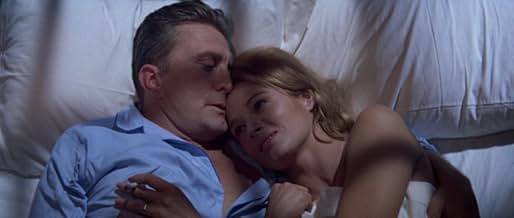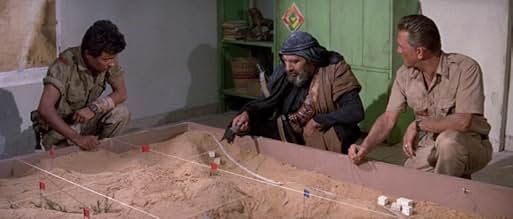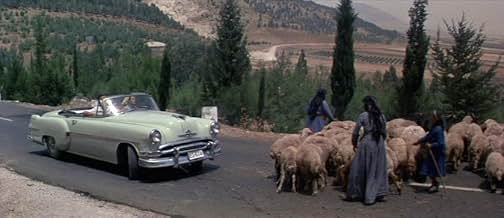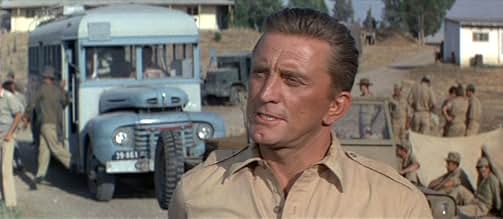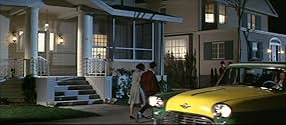Em 1947, após a decisão da ONU de dividir a Palestina Britânica em estados judeus e árabes separados, um ex-oficial do Exército dos EUA é recrutado pelos judeus para reorganizar a Haganah.Em 1947, após a decisão da ONU de dividir a Palestina Britânica em estados judeus e árabes separados, um ex-oficial do Exército dos EUA é recrutado pelos judeus para reorganizar a Haganah.Em 1947, após a decisão da ONU de dividir a Palestina Britânica em estados judeus e árabes separados, um ex-oficial do Exército dos EUA é recrutado pelos judeus para reorganizar a Haganah.
- Direção
- Roteiristas
- Artistas
- Direção
- Roteiristas
- Elenco e equipe completos
- Produção, bilheteria e muito mais no IMDbPro
Avaliações em destaque
The script tells us things that most of us already know, without adding much that we didn't. Thankfully it avoid extensive shots of the death camps. If anyone needs to be told about that, he's hopelessly benighted anyway. That mass genocide was perhaps the most horrible expression of the baser impulses of human nature, and like any transcendental event should be treated with caution, not with an eye to the box office.
Still, the dialog is flat and ordinary. Giant closeups of faces telling us important things -- "For the first time, I've realized I'm a Jew" -- doesn't really help. It's like being hit over the head by someone wielding a crowbar and yelling -- "GET IT? GET IT?" Yes, we get it. Stop already.
Kirk Douglas isn't bad. In fact he's pretty good, outdone only by Topol as an Arab sheyk -- "I course your Faddair." Cheese, Topol is good. And so is his role. He plays "The Sheik of Arabie" on a Victrola and rolls his eyes with glee.
John Wayne's performance is perfunctory and so is Frank Sinatra's, but the latter's involvement is interesting. At one point in the film he protests, "Don't leave me alone -- I'm anti-Semitic." Far from being anti-Semitic he was, let's say, pro-Semitic. Like a lot of recent immigrant families in the Northeast his had a keen eye for the strengths and weaknesses of ethnicity, and Sinatra plumped for the strengths in Judaism. He envied and admired Jews for their family values and their solidarity, and even learned to read a little Hebrew. A scene in which he spurts seltzer water at an attacking Arab fighter is beneath comment.
Overall the film is not a success because it doesn't spell out in any detail exactly what Mickey Marcus actually DID for the Israelies. It won't do to have two minutes of Marcus telling them "Attack! Attack!," when ten times that amount is spent on an unconvincing adulterous affair with Senta Berger -- not that having such an affair with such a magnificent woman would be a blot on anyone's escutcheon. (I could never spell that word. It means "shield".) I guess it's worth watching once, just to remind us of a part of history that some of us have not bothered to look into. As a film, (shrug).
For what it's worth most of the weapons were realistic, the Jordanians were equipped with the proper British arms; SMLEs and Vickers and Bren guns. I'd liked to have seen Glubb Pasha.
The story goes back and forth between sappy and inspired. The scene where the Israelis declare their independence brought tears to my eyes but I'm notorious for the manly tear.
A good story, largely based on historic events. Covers the formation of the state of Israel and its initial military struggles against massive odds.
However, doesn't cover the events in much depth though. Much time is wasted on sub-plots, almost all of which add nothing to the story.
These sub-plots, especially the romantic angle with Marcus and Magda Simon, not only use up film time that could have been better spent, but make the film quite clumsy. So many contrivances and Hollywoodisms. Just about every piece of dialogue seems written as a soundbite, a one-line zinger. It all just seems so cheesy.
Clearly almost the entire budget was spent on a two minute cameo by John Wayne because even for 1966 the special effects were poor, the dialogue was flat, the plot was boring, many scenes made little sense, and every actor either seemed bored with his or her role or they overacted. For a movie based on actual events the filmmakers due an incredibly poor job of explaining how things actually come to pass in the movie, maybe the truth was just too boring. The film sends a message but it is poorly conveyed and in the end I simply am left unsatisfied with a desire to see a Longest Day type caliber movie about the Israeli War of Independence.
Você sabia?
- CuriosidadesMichael Douglas' uncredited role (and theatrical movie debut) came about when an Israeli actor refused to perform a driving stunt, claiming it was too dangerous. Kirk Douglas, trusting his son's skill as a driver, enlisted Michael to fill in on the spot.
- Erros de gravaçãoWhen first seen, Angie Dickinson and Senta Berger are shown wearing fashions from the 1960s when the film was made, not the 1940s when the film was set.
- Citações
Col. David 'Mickey' Marcus: Why do you let women to go on these convoys?
Asher Gonen: Magda volunteered.
Col. David 'Mickey' Marcus: She's been through enough. She just lost her husband, she's in a terrible st...
Asher Gonen: Look, we need everyone. Especially since the British search us for weapons. Being British, they're also too polite most of the time to search a woman thoroughly.
Col. David 'Mickey' Marcus: You're lucky you're not occupied by the French.
- Cenas durante ou pós-créditosThe major events in this film actually happened. Some of them are still happening. The major characters actually lived. Many of them are still living. Although it was not easy.
- ConexõesFeatured in Hollywoodism: Jews, Movies and the American Dream (1998)
- Trilhas sonorasNext Year in Jerusalem
Music by Dov Seltzer
Principais escolhas
- How long is Cast a Giant Shadow?Fornecido pela Alexa
Detalhes
- Data de lançamento
- País de origem
- Idiomas
- Também conhecido como
- La sombra de un gigante
- Locações de filme
- Empresas de produção
- Consulte mais créditos da empresa na IMDbPro
- Tempo de duração
- 2 h 26 min(146 min)
- Proporção
- 2.35 : 1


